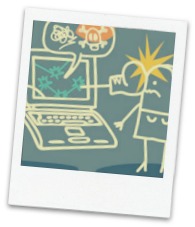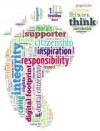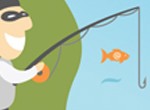This is a supporting framework to guide teachers in unpacking what has clearly become a topic of importance in the use of technology to do work. It is part of the skillset toolbox of global literate citizens.
This is a supporting framework to guide teachers in unpacking what has clearly become a topic of importance in the use of technology to do work. It is part of the skillset toolbox of global literate citizens.
Every time you search for something on the internet, you come face to face with the notion of ‘creative credit and copyright’.
Here’s a quick activity:
What rights do individuals who create works and post them up for an audience have? You may be surprised at what you find out. Watch this video to find out.
Given this information, how would you act as a digital citizen?
Coming Soon!
 When we first started this launch, our theme was ‘Relationships and Communication’. We stated,
When we first started this launch, our theme was ‘Relationships and Communication’. We stated,
“Relationships are built on our understandings of values and beliefs (family, community, cultural community, school). These values impact our behaviours and actions.”
This rings true again for this month’s theme. Cyberbullying is more complex than bullying as internet or any wifi allows a significant amplification of that message. No, it cannot be erased and the old adage of “sticks and stones” do not apply. Watch this video to learn what the RCMP describes as cyberbullying.
Here’s a Cyber Smart Kids Quiz that you can take as a class: https://www.esafety.gov.au/kids-quiz/
Now how does this connect with the person you want to be? Do you have a plan if cyberbullying occurs?
FOR PARENTS:
While there are many sites that students use and this list can change very quickly, what is important to keep in mind is the way in which sites are able to bring together a networked community. How do we help our children negotiate through, analyze and evaluate the content so they make informed decisions? For example, consider Youtube, Twitter, Facebook, WhatsApp. They can be great communities where you learn many things, share your creativity and comment on others’ work. They can also be places where negative comments run rampant. Consider this article, Children Ignore Age Limits by Opening Social Media Accounts. While this is a UK article, it is fairly common to hear in our schools, young students saying they have a personal Facebook or other social media account.
make informed decisions? For example, consider Youtube, Twitter, Facebook, WhatsApp. They can be great communities where you learn many things, share your creativity and comment on others’ work. They can also be places where negative comments run rampant. Consider this article, Children Ignore Age Limits by Opening Social Media Accounts. While this is a UK article, it is fairly common to hear in our schools, young students saying they have a personal Facebook or other social media account.
Ask your child where their digital conversations reside or that of their friends. A great conversation starter.
 Have you ever walked on a sandy beach or a muddy trail, turned around only to see your footprints clearly left behind? The same thing happens when you enter the web world but the difference is your online activity can leave a permanent trail… a digital footprint that is a reflection of you. As every digital citizen has a significant amount of control over what is shared and how it is shared, what kind of footprint do you want to create as you walk in your daily digital path?
Have you ever walked on a sandy beach or a muddy trail, turned around only to see your footprints clearly left behind? The same thing happens when you enter the web world but the difference is your online activity can leave a permanent trail… a digital footprint that is a reflection of you. As every digital citizen has a significant amount of control over what is shared and how it is shared, what kind of footprint do you want to create as you walk in your daily digital path?
Don’t sweat! Your digital presence and reputation is in your hands. Choose to build a positive online identity – one that truly represents the kind of person you want to be. Before you share, stop and think about the identity you are choosing to build and maintain, and reflect on how it will affect your reputation now and in the future. Take pride in your digital footprint at any age. People in all walks of life will respond well to a positive online representation of you whether you are 10 or 110! Click here for classroom activities.
Check out other resources on digital footprint and reputation:
FOR PARENTS
Continue to have conversations with your child about what they share online and the kind of reputation they are building. Make these discussions a regular everyday topic! Click here for a Family Tip Sheet on Privacy and Digital Footprints from Common Sense Media.
March was a short month filled with activity and Spring Break. The winner of Internet Safety Month was Satpaul Binng’s class at Maywood. Click here to see what they have to say. Their information was captured using Adobe Voice.
Stay tuned for April – Digital Footprint & Reputation.
 Whenever we think of Digital Citizenship, ‘internet safety’ always seem to pop up as the first area of concern. While this may be true, we would like to consider that this topic is nothing more than offering our students opportunities to make critical choices with their behaviours (whether they are online or face-to-face).
Whenever we think of Digital Citizenship, ‘internet safety’ always seem to pop up as the first area of concern. While this may be true, we would like to consider that this topic is nothing more than offering our students opportunities to make critical choices with their behaviours (whether they are online or face-to-face).
One consideration for ‘internet safety’ is how we deal with our passwords. They are our gateway security to information. We use them to access many sites like banking, online documents, games (eg. Minecraft, Webkinz), or purchasing sites like Amazon and iTunes. At school we use passwords to log onto our computer accounts. How do you know a good password when you see one? Or are you the type that uses the simplest ones to aid your memory and share them with your friends? Click here for a classroom activity on passwords.
Now that you have information on passwords, it’s time to put your knowledge to action. Check out these activities to see if you can be stumped!
FOR PARENTS
Relationships are the most important factor in keeping communication lines open between yourself and your child. (Check out February’s posts on Relationships and Communication.)
Read Tips on Internet Safety. Take a look around the house. Are there areas that might need to be addressed? Have a discussion with your child (it’s never too early).
Instagram (or Finstagram, Rinstagram) is an online mobile photo, video and social networking service that allows public or private sharing on the app, as well as through other social networking platforms, such as Facebook, Tumblr, Twitter and Flickr.
Learn about Instagram here.
Questions to think about.
Talk with your family.
What images might be ok to post? What might not? How will children deal with images that are posted by friends? How can a family empower children with knowledge to make decisions?
After humming and humming some more – we have a winner for the month of February! Well two winners actually. Congratulations and ‘high-fives’ to the classes of Liane Karvelis/Jennifer Raptis at Capitol Hill and Derek Milloy at Douglas Road. Their sites, The Bell Tower’s ABuzz and Mr Milloy’s Class show creativity and genius in how they made it real with the students. We invite you to hop on over and check out their sites. I see pizza coming their way.
Next month (oooh that’s next week) is March – Internet Safety. Put on your thinking caps, splash in some puddles and come join us.
Digital Literacy & Citizenship ©2024. All Rights Reserved.
Powered by WordPress.
Theme by Phoenix Web Solutions